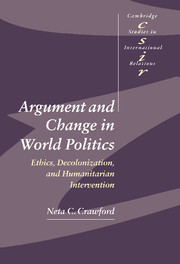Book contents
- Frontmatter
- Contents
- List of illustrations
- List of tables
- Acknowledgments
- Introduction
- 1 Argument, belief, and culture
- 2 Ethical argument and argument analysis
- 3 Colonial arguments
- 4 Decolonizing bodies: ending slavery and denormalizing forced labor
- 5 Faces of humanitarianism, rivers of blood
- 6 Sacred trust
- 7 Self-determination
- 8 Alternative explanations, counterfactuals, and causation
- 9 Poiesis and praxis: toward ethical world politics
- Appendix. African decolonization
- Select Bibliography
- Index
- CAMBRIDGE STUDIES IN INTERNATIONAL RELATIONS
2 - Ethical argument and argument analysis
Published online by Cambridge University Press: 22 September 2009
- Frontmatter
- Contents
- List of illustrations
- List of tables
- Acknowledgments
- Introduction
- 1 Argument, belief, and culture
- 2 Ethical argument and argument analysis
- 3 Colonial arguments
- 4 Decolonizing bodies: ending slavery and denormalizing forced labor
- 5 Faces of humanitarianism, rivers of blood
- 6 Sacred trust
- 7 Self-determination
- 8 Alternative explanations, counterfactuals, and causation
- 9 Poiesis and praxis: toward ethical world politics
- Appendix. African decolonization
- Select Bibliography
- Index
- CAMBRIDGE STUDIES IN INTERNATIONAL RELATIONS
Summary
I want to account for the ways in which men and women who are not lawyers but simply citizens (and sometimes soldiers) argue about war, and to expound the terms we commonly use. I am concerned precisely with the present structure of the moral world. My starting point is the fact that we do argue, often to different purposes, to be sure, but in a mutually comprehensible fashion: else there would be no point in arguing. We justify our conduct; we judge the conduct of others. Though these justifications cannot be studied like the records of a criminal court, they are nevertheless, a legitimate subject of study.
Ethical argument is ostensibly the hard case for demonstrating the importance of argument in world politics. To make an ethical argument, as opposed to any other kind of argument is to propose three things simultaneously: that a behavior or course of action is good and right; that others ought to do this good thing; and that despite the strength of my conviction, I will not force you to do what I believe is the good, but rather I seek to persuade you to believe as I do and act according to that belief. Further, ethical arguments clearly rest on normative beliefs, but they are also usually closely related to identity and constitutive beliefs.
- Type
- Chapter
- Information
- Argument and Change in World PoliticsEthics, Decolonization, and Humanitarian Intervention, pp. 82 - 130Publisher: Cambridge University PressPrint publication year: 2002
- 1
- Cited by

